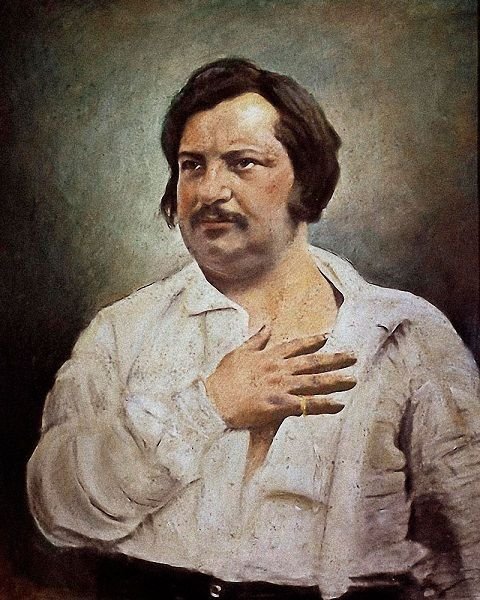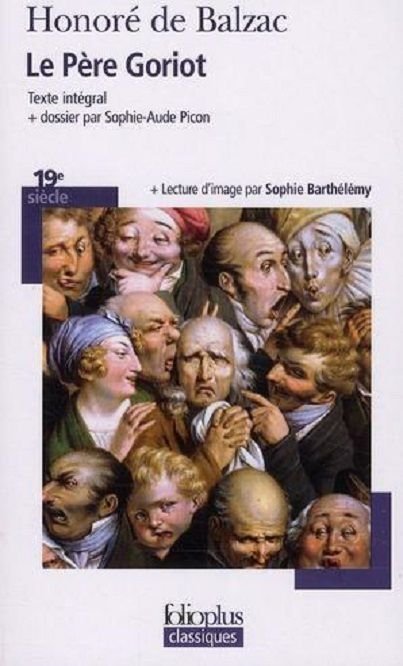The social realism is a concept preferred by Western Literature. In the center of the image here is the man in his social environment with all causal relations. In the first half of the nineteenth century, realism in France is not yet perceived as a distinct strand or style, but as a component of Romanticism. The principle of reflecting reality determines the physiognomy of social realism. Honore de Balzac belongs to the direction of realism, the naturalist school and in his works creates a psychologically motivated and true picture of society. Balzac knows the images as well as the artists of Romanticism but does not ignore the clear conceptual messages. The ambition of Balzac's inexhaustible creative spirit is to create a grandiose cycle titled "Human Comedy" and to fit all public types, all social strata, all social changes so that they will not be forgotten. According to the concept of "Human Comedy", the novel "Le Pere Goriot" belongs to the stages of social and human morals.
The actual scheme of the novel unfolds multifaceted. The title directs us to the story of the main character,"Le Pere Goriot," but around it almost equally, there are other storylines, such as the story of Eugene de Rastignac or the Votrein prisoner. The novel "Le Pere Goriot," is a complete reflection of the life of French society. Two opposing worlds are revealed in the work - on the one hand, the retirement where misery and misery lie, and on the other - the glamorous aristocracy, filled with a number of vices, degrading human morality. An important role in the work is the "new hero of the age" - the poor student Eugen de Rastignac , who is ready for everything, driven by the strong ambition to become part of the higher class. Rastignac is a young, enthusiastic provincial who arrives in the big city with a head full of dreams and plans, but with empty pockets. At first he resisted the general corruption. Towards the end of the novel, the hero who tasted the temptations of high society began to retreat from his position. On the day of the grandfather's funeral, Rastignac testified to his own surrender through the temptation to the seductive monster-Paris. Buried his youthful illusions and dreams, Rastignac seems to be forgiving with the lightest and most attractive part of his personality.
Eugen de Rastignac is a young countryman from a depleted noble family who arrives in Paris to follow right. He arrives in the capital with the idealism of youth, with a pure and immaculate heart, he believes in himself, in the people, in the good, thinks that life is tough but endless are man's abilities to overcome them and to come out to the world with pure and a clear face. The image of the hero is complex and controversial, passed on to development. The young student does not have strictly individual features, he still builds his character, absorbing less than any of his surroundings. In his image, different views of life are combined, morals and vices collide. Rastignac has the ambition to achieve everything in his life through labor and abilities. Although he has insufficient experience of life, the law student quickly realizes that in Paris society, he values man more in terms of his outwardness and riches than what he has in his heart and mind: "While he kept his clothes in the day, he was wearing the old his costumes, he sometimes went out dressed as a real connotation. " The brilliance of the higher society draws Eugene with force, and one of the characteristic ballast passions is blazing in it - the ambition to rise above the others, to succeed at all costs. He learns the lessons taught to him by the higher society but has not yet lost his human kindness and integrity. But yet he has already set his own course, apparently deciding to conquer Paris, to "sneak" into the higher society. Rastynjack immediately grasps the mechanism of success among the higher circles-the necessary elegant appearance, cynicism. The young outlaw understands that in order to thrive in the higher society, it is necessary to subdue all the noble feelings that have ever excited him. It is not a memory of his pure ideals very quickly. He understands that the path of public elevation is the road of compromise, and then the sale of virtues.
Cultivan perceives the lesson of Vicconte de Bossane, who, in his personal irritability and insult, outlines the principles and writes the entrance ticket for the higher society, intended for young, uncreated, yet clever and purposeful young men. The young student is increasingly faced with the dilemma: either to fail, as thousands of poor students like him fail, or to bounce back to the heights of the Parisian society, no matter how. Eugene does not have the money, initially decides to take a significant loan from his family, then starts gambling, but his funds are still insufficient. At this point, Votren stood next to him, generously offering his help. The ambitious young man fails to resist temptation. Having managed to attract to his side by convincing him that by marrying a heir to a rich man he will gain a place among the glamorous society. Votren has a heroic plan from which he himself obtains the greatest benefit. Balzac admires openly to Eugen in the final of the book - his last words the author calls "grandiose", and he almost represents him as a knight-avenger for the death of Goriot and the Bossian constellation. Eugene was first introduced as a strong personality. The great power contained within it, the confusion made by Eugen to society, is an external expression of the adventurous internal conflict, because of the energy of the person, previously blocked by internal struggle, is now directed to society. The struggle with hiof hwith himself has ended, a struggle with society is to come. The final shows another thing. The solution to the "personality-society" conflict of one of the main hero-grandfather Goriot ends with his death. But in his place stands Eugene de Rastiniak, the hero of the new age. In the novel "Le Pere Goriot," painting the Parisian society in the middle of the nineteenth century, Balzac sets out his notion of a world where, according to Votren, people resemble "spiders in a jar", eats and destroys the embryos of integrity and kindness.


good job bro
thank you